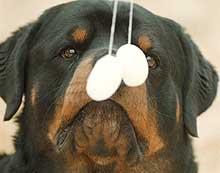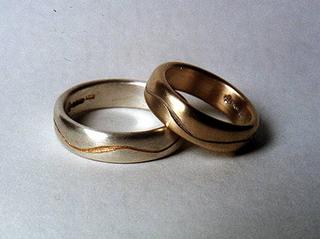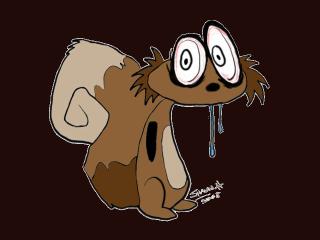Neuter my dog? Well, nuts to that!
By DOUG LUNNEY -- Sun Media

Hogan's heroes ... Hogan the Rottweiler eyes a pair of Neuticles, prosthetic dog testicles that have the potential to restore at least some of his former glory. -- Joe Klamar, WINNIPEG SUN
Greg Miller cringed when his beloved bloodhound Buck was about to be neutered.
Then a nutty idea came to mind.
Less than two years later -- in December 1995 -- a Rottweiler in Independence, Mo., named Max received the first pair of Neuticles, which are testicular implants for neutered dogs, cats, horses and bulls.
Now that he's got the balls rolling, Neuticles are becoming more common outside the United States, says Miller, admitting he sent a pair of Neuticles to a woman in Prince George, B.C., last week (presumably for her dog) and he's getting more and more clients in Canada.
"We've done 35,000 pets worldwide and not one single problem. No complications of any type," he boasts.
Any veterinarian can implant Neuticles -- they just have to have the -- uh -- testicles to do it.
"It's real simple (surgery)," he says. "Normally it's done when the pet is neutered and the neutering procedure, of course, was developed in the early 1800s. The open castration technique that the vet uses requires the permanent removal of the pet's testicles. That's where Neuticles come in.
"When the vet neuters the pet ... they slip in the Neuticles and the pet looks exactly the same."
The obvious question: "Why?"
"Why not?" Miller replies. "Where is it written that the pet has to lose its testicles? Getting neutered is bad enough, but to add insult to injury by leaving the poor little guy with nothing ... For $30 to $37 (US), your pet can look the same.
"People don't want their pet to look emasculated. With any breed of dog that's short-haired, it's part of their personality."
Miller has a degree in journalism and he was an editor at a newspaper in Loveland, Colo., before working in sales for 13 years with a candy company.
When the type of candy he was selling lost its popularity, he invented Neuticles. He has since introduced five sizes and three models, all made of polypropylene -- a material that coats some human implants and surgical equipment.
"A lot of pet owners wanted a softer, more natural testicle, so a year ago we came out with our Neuticle Natural, and it's an exact replication of the canine testicle," Miller says. "It's softer, as lifelike as can be."
Clients wanted an even softer model, which led to last week's introduction of the "marshmallow soft" Neuticle Ultra, he says.
Miller is writing a book about his invention, called Going Nuts. Meanwhile, potential clients can learn about his product on his Web site (www.neuticles.com), which also offers merchandise such as ball caps, T-shirts and watches.
"You'll never lose your keys again with a Neuticle key ring," Miller vows. "And I dare you to pull it out at some Sunday dinner and say 'Guess what this is?' "
Meanwhile, veterinarian Philipp Schott isn't convinced testicular implants for animals are a good idea. "I would just hands-down refuse to do it," Schott says. "It's human vanity. It doesn't benefit the dog in any way.
"Although it would be minor surgery to implant them, nonetheless it's surgery and I don't see the point in doing unnecessary surgery -- exposing the patient to risks, anesthetics. Although modern anesthetics are extremely safe, it's not a zero risk-type of procedure."
When told most Neuticles are implanted during the neutering process, Schott says he wouldn't want to keep an animal under anesthetic longer than necessary. He also voiced concerns about long-term effects.
Where is it written that the pet has to lose its testicles?









